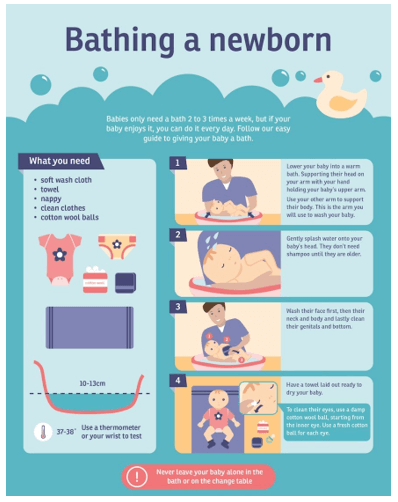A nurse is reinforcing teaching with a new parent about bathing her newborn.
Which of the following statements should the nurse include?
Apply talcum powder daily after bathing in order to prevent diaper rash.
Use an alkaline soap to bathe the baby.
Perform sponge baths until the baby's umbilical cord falls off.
Ensure the bath water is at least 96 degrees Fahrenheit.
The Correct Answer is C
Explanation:
Sponge baths are recommended until the umbilical cord stump falls off, which typically occurs within the first two weeks of life. After that, the baby can be immersed in water for a regular bath.
Using talcum powder is not recommended as it can be harmful to the baby's respiratory system if inhaled. Mild, pH-balanced soap should be used instead of alkaline soap to avoid irritating the baby's delicate skin.
The bathwater temperature should be around 98 degrees Fahrenheit and not hoter than 100 degrees Fahrenheit to prevent burns.

Nursing Test Bank
Naxlex Comprehensive Predictor Exams
Related Questions
Correct Answer is B
Explanation
The nurse should identify that disposing of contaminated sheets in a linen bag demonstrates effective use of supplies.
Wearing an N95 mask when bathing a client with Clostridium difficile is important, but it is not related to effective use of supplies.
Wearing clean gloves when performing oral hygiene is standard practice for infection control and not specific to the use of supplies.
Empting the sharps container when it is full is also important, but it is not related to effective use of supplies.
Correct Answer is D
Explanation
Herpes simplex is primarily transmitted through direct contact with the skin or mucous membranes of an infected individual. Contact precautions are designed to prevent the spread of microorganisms that are transmitted by direct contact or indirect contact with contaminated surfaces. These precautions include wearing gloves and a gown when entering the client's room, ensuring proper hand hygiene, and using dedicated equipment for the client.
Droplet precautions are used for infections that are transmitted through respiratory droplets generated by coughing, sneezing, or talking, such as influenza or pertussis.
Airborne precautions are used for infections that are transmitted by smaller droplet nuclei that can remain suspended in the air for longer periods, such as tuberculosis or measles.
Protective environment is a specialized isolation precaution used for clients with compromised immune systems, such as those undergoing stem cell transplantation, and involves strict control of the environment to reduce the risk of acquiring infections.
Whether you are a student looking to ace your exams or a practicing nurse seeking to enhance your expertise , our nursing education contents will empower you with the confidence and competence to make a difference in the lives of patients and become a respected leader in the healthcare field.
Visit Naxlex, invest in your future and unlock endless possibilities with our unparalleled nursing education contents today
Report Wrong Answer on the Current Question
Do you disagree with the answer? If yes, what is your expected answer? Explain.
Kindly be descriptive with the issue you are facing.
